

Home | Quotations | Newspaper Articles | Special Features | Links | Search
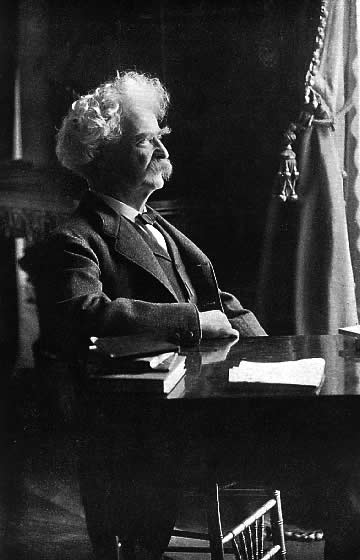 MARK TWAIN IN HIS ITALIAN STUDY (From a photograph taken especially for THE CRITIC. Copyright 1904 by the CRITIC CO.) |
THE
CRITIC
|
ON the sixth of last November, Mark Twain disembarked at Genoa from the German steamship Princess Irene, after a delightful passage, during which he had taken advantage of every stop to go ashore and see all the sights. The curiosity of the professional reporter is still in his blood; he scents in the very air an interesting bit of news, a fresh note, an attractive detail. At Genoa an actual reporter was lying in wait for him as he made his way towards the Ponte Federico Guglielmo. The journalist lost no time in serving up his little dish of impressions; and this was the manner of it:
I caught him while he was getting out of the train, surrounded by a whole outfit of nice little brass-studded trunks and portmanteaus of all sizes. With him were his daughters, lively girls, with the real American freedom of manner; his wife, whose face looks dry and severe under the large spectacles which bestride her thin nose, and a smooth-faced young valet of the proper woodenness of bearing. With the purpose of avoiding any indiscreet questions, he seized some cushions, a shawl-strap, and a bag or two, huddling them together under his left arm, while a large book peeped out from under his right. Thus loaded down, he went off towards the custom-house at a rapid pace.
Mark Twain is not a man to grumble at these little annoyances, which are inseparable from celebrity. He himself at one time lived the agitated life of the reporter, and although he probably did not suspect in those days that the time would come when his confreres of every nationality would pursue him relentlessly, still he manages to find for them a pleasant, flattering speech or a pointed epigram out of which an interview can, with some ingenuity, be constructed.
He is a passionate lover of Italy, in which for year a number of American authors and artists have pitched their tents. Florence is the city especially affected by the Americans and English, who flock there in great numbers every year.
| The most important personage in the group is Mark Twain, as the villa of his selection is the most sumptuous of them all. The Villa di Quarto lies in a charmingly picturesque spot not far from Florence. It has sheltered the most illustrious people, and all of them have admired its beauty, both natural and artificial -- its magnificent grounds with broad avenues, fountains, and smiling gardens. An idea of it size -- the circumference of the park is over two miles -- may be given by saying that at one time a Russian princess lived there with a suite of one hundred persons. Victor Emanuel II visited it frequently, as it is close to the royal country seat of La Petraia. | 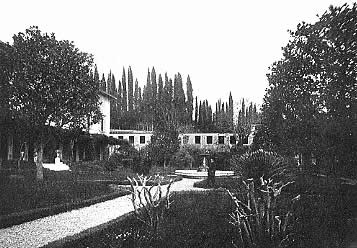 A VIEW OF THE GARDENS (From a photograph taken especially for THE CRITIC. Copyright 1904 by the CRITIC CO.) |
Mark Twain was at Genoa in 1869, on his way back from Egypt and the Holy Land, and has spoken of it at some length in his "Innocents Abroad," not forgetting some flattering words for its beautiful women. But Florence is the city of his choice -- not because it is the birthplace of Dante, but because its delightful climate renews youth and gives health to the invalid. Ten years ago he spent sometime at Settignano, where Gabriele d' Annunzio's villa is situated. Mr. Clemens came there worn out and ill, and went away in robust health of body and mind. He has now come back with his family in the hope of effecting a speedy and permanent improvement in his wife's health. He has leased the villa for a year, at the rental of twenty thousand francs -- a figure which makes a deep impression on our Italian writers, who have never succeeded in getting rich, even when they have had their little quarter of an hour of celebrity or have taken a firmer hold on fame.
Mr. Clemens has a very retiring temperament, and the intimates who pass the gates of his villa are not many. At the end of November he completed his sixty-eighth year, but his old age has an extraordinary vigor and freshness. He is a remarkable person, who binds others to him by a sentiment which is almost more than friendship.
|
|
Mark Twain's life is regulated by a system. He takes but one meal a day, in the evening. All day long he is at work; during the good part of the night he strolls alone about the immense grounds of the villa, meditating and shaping in his mind the sketches which are destined to make future generations laugh -- and to enrich his publishers. If you met him, you might think we was one of the ordinary people who are weary of life, and that he was turning over in his mind a plan for ending it one and for all. Instead of that, the brain of the man who walks there, silent amid the stillness of the night, is occupied by a rapid procession of memories of all the things which he has observed on the varied stage of human life. Out of this confused mass of visions and recollections, Mark Twain picks out the most delicious comic figures, which in the morning he will fix on paper with two or three of those sure touches that are the secret of his success as a writer. |
When the amount of his work becomes oppressive, he has a secretary, an intelligent American girl, to whom he dictates letters and articles. Sometimes, if the day promises to be fine, he comes down into Florence with Clara and Jean, his idolized daughters, to enjoy the poetical beauty of the Arno and of the children playing on its bank. Often he stops and asks them some question; and the little Tuscan boys, lively and self-possessed, answer him in their charming dialect, of which the great humorist is very fond. This is his favorite method of learning Italian.
On one of his visits to Florence he noticed that many people passed him with a familiar and friendly salutation, "Buon giorno, Borzì!" Mark Twain, though he was at a loss to explain his sudden popularity, answered with the same cordiality, "Buon giorno, buon giorno!" He finally succeeded in getting an explanation from his friend Carlo Paladini, the publicist. The fact was simply that Professor Antonio Borzi, Director of the Botanical Gardens at Palermo, a distinguished and scholarly man well known in Florence, has such a striking likeness to Mark Twain that even his friends were deceived.
| At the Villa di Quarto Mr. Clemens's daughters take long rides under the shade of the great old trees that overhang the board and easy roads. They are both accomplished and ardent horsewomen. Miss Jean, whose portrait is given on page 523, has recently bought a superb white horse. Her sister, Miss Clara, has a beautiful voice, and sings with exquisite grace. On the 8th of April, she took part in a concert given by the Philharmonic Society of Florence, and made a deep impression on the audience. The possession of two such daughters is a great comfort to Mr. Clemens. The go everywhere with him, surround him with affectionate attentions, and take a gentle and tender care of him. | 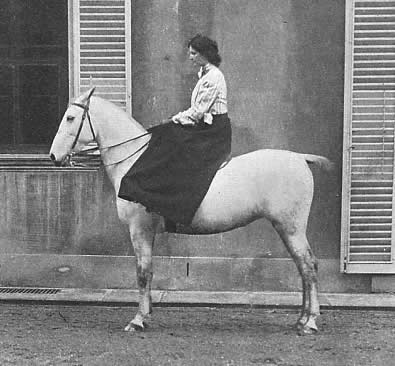 MISS JEAN CLEMENS (From a photograph taken especially for THE CRITIC. Copyright, 1904 by the CRITIC CO.) |
Miss Jean's, for instance, helps her father not a little with his daily work. When he does not dictate, he leaves little sheets of manuscript scattered everywhere; it is Miss Jean's task to collect and arrange them, and then to copy them on the typewriter. Mark Twain's correspondence is naturally very large. A man is employed to go into Florence twice a day to bring the mail, and always returns loaded down with letters, papers, and books.
It is uncertain how long the famous humorist will remain in Italy. His lease of the Villa di Quarto is only for a year, but Signora Marsili, the owner, thinks that he will renew it when it expires, since he is so well and comfortable in Florence, and since his wife's health has already shown a marked improvement.
|
Mrs. Clemens, his faithful companion for twenty-five years, unlike her husband, is an enthusiastic student of the masterpieces of art and of historical associations. Mark Twain has his own ideas about art, which are a subject of frequent controversy with his wife. She is a great admirer of Botticelli, while he stoutly maintains that the Pre-Raphaelite painters represent the infancy of art, "What would you say to the cook," so he puts it, "if she still persisted in providing you, at your present age, with nothing but milk for breakfast, dinner, and supper?" Few of Mark Twain's numerous volumes are known in Italy, outside of "Personal Recollections of Joan of Arc," which met with considerable success. Translation, however accurate and conscientious, fails to render the special flavor of his work; and the result is only a lame copy in which the sparkle of true wit is lamentably absent. |
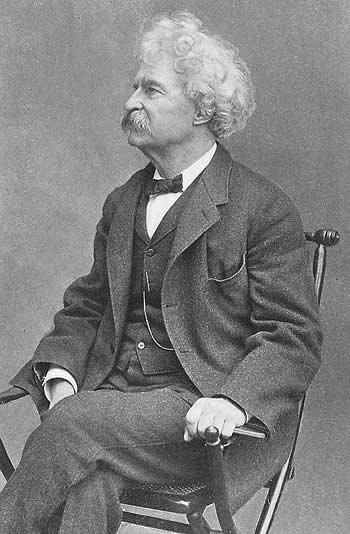 MARK TWAIN BEING INTERVIEWED (From a photograph taken especially for THE CRITIC. Copyright, 1904 by the CRITIC CO.) |
And then in Italy,where humorous writing generally either rests on a political basis or depends on risky phrases, Mark Twain's sketches are not appreciated because the spirit which breathes in them is not always understood. The story of the "Jumping Frog," for instance, famous as it is in America and England, has made little impression in France or Italy. Still, its author holds an unquestioned sovereignty in the realm of humor, and the newspapers have a stock of old things of his on hand, which they present to their readers as choice morsels. Even this is a homage on the part of Italy to the great writer who is sojourning within her gates; and every one hopes that the sunny climate of the peninsula may restore Mrs. Clemens's health, and inspire her husband to give us another masterpiece.
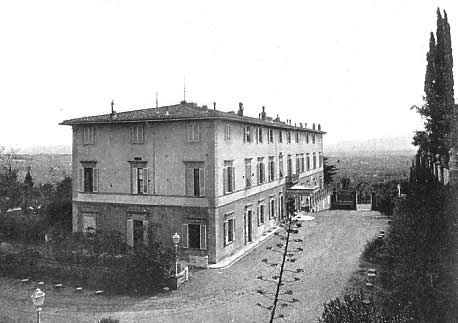
A VIEW OF THE
VILLA DI QUARTO
(From
a photograph taken especially for THE CRITIC. Copyright, 1904 by the CRITIC
CO.)

Home |
Quotations | Newspaper Articles
| Special Features |
Links | Search